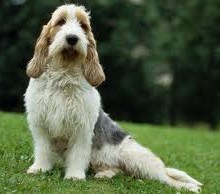Basset Griffon Vendeen (Grand)
Lifestyle Needs

The Grand Basset Griffon Vendeen, or GBGV, apparently was used to hunt rabbit and hare. He arrived in the UK from France in the 1990s. He is typically lively and active with a tendency to ‘escape’ when there is a tempting distraction. He should make a suitable family pet but needs plenty of activity to keep him physically and mentally happy. He will love off lead walking but first needs to be trained to return when called. He’s a dog with character and a rather loud voice. His coat is long and needs daily grooming.
Genetic Diversity
(Known as Coefficient of Inbreeding: 'COI'. It should be as low as possible.)
The UK Kennel Club breed average COI is 7.2% - See 'A Beginners Guide to COI'
Gene Pool Size
(Known as Effective Population Size: 'EPS')
TBC
EPS is a measure of how many individuals are contributing genetically to a breed population. It is a measure of the size of the gene pool in a breed. Lower than 100 is considered critical by conservationists and below 50 brings a breed close to extinction. For more information see the Kennel Club article.
Health and Welfare Problems due to Conformation
(Body shape and physical characteristics)
The GBGV’s coat will easily harbour dirt and debris which could encourage skin problems and must be kept clean and free from tangles. Similarly his long, hairy ears could encourage ear infections unless kept clean His ability to see could be hampered if hair around the face is not trimmed.
BVA/KC Health Schemes: www.bva.co.uk/chs
- Hip dysplasia: breed mean score not known
- Eye Scheme
Estimated Breeding Values (EBVs) : No EBVs are currently available for this breed
www.thekennelclub.org.uk/about-ebvs
DNA Tests Available
DogWellNet and IPFD Harmonisation of Genetic Testing for Dogs (HGTD)
www.dogwellnet.com/breeds
X-linked Myopathy (poor locomotion and weakness in pups)
Note there is a lack of health information on this breed due to its recent introduction into the UK.
Availability of a DNA test does not mean that it is always necessary or even desirable for breeders to use this test.
Other Breed-Specific Health Screening Schemes
None known
Ask the breeder to show you the certificates for the above tests/screening for both parents. If any of the above tests have not been considered necessary by the breeder (and there may be good reasons), ask her to explain why.
Other Diseases Reported
(For which there are currently no genetic or screening tests for sire or dam)
- Epilepsy
- Hypothyroidism
Ask the breeder about the medical history of the parents, grandparents and great grandparents. Consider carefully whether to purchase a puppy if some of these or other diseases are in the family line.
Ask about the breeder’s policy in cases of serious genetic diseases occurring to your puppy in later life. Good breeders will request to be informed of such events in order to improve future breeding decisions.
You are strongly advised to buy from a breeder who uses (or is prepared to use) the AWF Puppy Contract and Puppy Information Pack (PIP): www.puppycontract.org.uk
The breeder should also be familiar with the CFSG/DBRG Code of Practice for Dog Breeding
Or the Kennel Club’s Assured Breeders Scheme Standard and Guidance:
Standard PDF | Guidance PDF